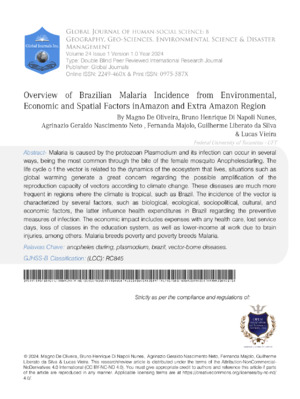Overview of Brazilian Malaria Incidence from Environmental, Economic and Spatial Factors in Amazon and Extra Amazon Region
Keywords:
anopheles darlingi; plasmodium; brazil; vector-borne diseases
Abstract
Malaria is caused by the protozoan Plasmodium and its infection can occur in several ways being the most common through the bite of the female mosquito Anopheles darling The life cycle of the vector is related to the dynamics of the ecosystem that lives situations such as global warming generate a great concern regarding the possible amplification of the reproduction capacity of vectors according to climate change These diseases are much more frequent in regions where the climate is tropical such as Brazil The incidence of the vector is characterized by several factors such as biological ecological sociopolitical cultural and economic factors the latter influence health expenditures in Brazil regarding the preventive measures of infection
Downloads
How to Cite
References

Published
2024-02-29
Issue
Section
License
Copyright (c) 2024 Authors and Global Journals Private Limited

This work is licensed under a Creative Commons Attribution 4.0 International License.